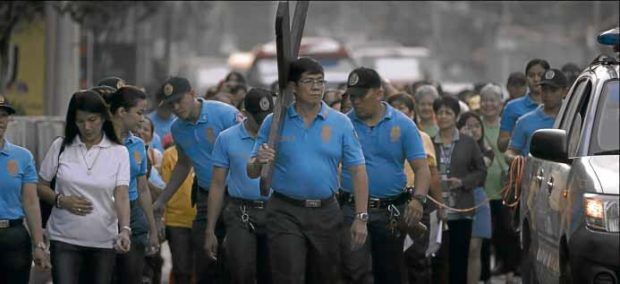
‘DEATHS ARE WORTH IT’ At the center of the documentary is Police Col. Jemar Modequillo, seen here carrying a cross, who was chief of Caloocan City Police during filming. —OLIVIERSARBIL.COM
MANILA, Philippines — “Are the police your friends or enemies? Who are your friends?” asked Col. Jemar Modequillo, the former Caloocan chief of police. He was speaking to a bunch of children in a covered court.
“The police,” the children, in their high-pitched voices, answered in chorus.
This is how the trailer of the documentary “On The President’s Orders” opens — with a question mark on the police’s role in President Rodrigo Duterte’s war on drugs.
To answer the question, Emmy-winning filmmakers James Jones and Olivier Sarbil filmed Modequillo and his men at the Caloocan City Police Station for six months in 2017 after the death of 17-year-old Kian Loyd delos Santos.
“We wanted to understand the perspective of the police who were waging this bloody war — and understand how they could justify the killing,” Jones told the Inquirer. “We discovered that they genuinely believe the deaths are worth it and that the drug war is working.”
Full access
The British filmmakers had full access to the operations of the police force and the city they protected.
The result is a visually stunning film that Variety called “a vivid drug war immersion.”
Jones and Sarbil bring viewers to the ground where law enforcers patrol and conduct drug operations. They also focus their camera on the families who lost loved ones in the war on drugs.
At the center of the film is the “tough disciplinarian” Modequillo, the man who executed the orders of the President in Caloocan.
“He reveled in his nickname ‘mananabas’ [cutter] and even had it engraved on his pistol. Like many of his men, he was a big fan of Duterte and believed the drug war was achieving results,” Jones said.
‘Trigger discipline’
He was “surprised” that the police allowed the team to film during operations. But Jones said the infamous station opened its doors to reshape its image to the public after the outcry over the death of Delos Santos.
During the six-month shooting, Jones said his group saw two deaths from armed encounters. This was due to the police’s restraint that Modequillo called ‘trigger discipline’ on operations.
“But by March 2018 there was a wave of riding-tandem shootings of people reportedly involved in drugs, which led to the public thinking the police were behind the killings. There was a feeling that the police’s killing had just gone underground,” Jones said.
Modequillo denied the theory that policemen were the unknown assailants on motorcycles, but he told the filmmakers there would always be “black sheep” in the force.
In the film, one police officer said: “President Duterte really hates drugs. A drug addict or drug pusher. That kind of person has no place here. That’s their choice. They don’t want to live anymore. They want to live in hell already.”
Shocking justification
While the President had repeatedly voiced his zero tolerance on illegal drugs, Jones said the police’s “brazen and matter-of-fact justification” would be shocking to international audiences.
In the film, police officers were seen conducting operations in full combat gear. Jones said that “on occasion the public was clearly terrified and the police took some pleasure in that.”
Victims’ families puzzled
The families of the drug war victims were puzzled why their loved ones were targeted in police operations.
“They felt the shootings must have been connected to the police, but had little faith they would ever find out the truth and get justice,” said Jones.
“On The President’s Orders,” produced by Frontline PBS and ARTE production, was shown on TV and streaming platforms.
The 71-minute film will play at Sheffield Doc/Fest, Great Britain’s biggest documentary festival, in June.
Though it has received attention abroad, Jones said there were no plans for screening the film in the Philippines. —With a report from Krixia Subingsubing

